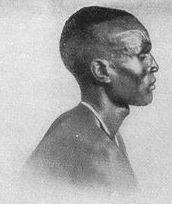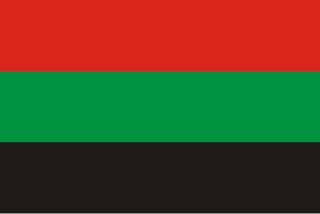
The Lord's Resistance Army insurgency is an ongoing guerrilla campaign waged by the Lord's Resistance Army (LRA) insurgent group since 1987. Currently, there is low-level LRA activity in eastern Democratic Republic of the Congo and the Central African Republic. The movement is led by Joseph Kony, who proclaims himself the "spokesperson" of God and a spirit medium. It aims to overthrow Yoweri Museveni's Ugandan government and establish a theocratic state based on a version of the Ten Commandments and Acholi tradition.

The Dinka people are a Nilotic ethnic group native to South Sudan with a sizable diaspora population abroad. The Dinka mostly live along the Nile, from Jonglei to Renk, in the region of Bahr el Ghazal, Upper Nile and the Abyei Area of the Ngok Dinka in South Sudan.

The Derg, officially the Provisional Military Administrative Council (PMAC), was the military junta that ruled present-day Ethiopia and Eritrea from 1974 to 1987, when the military leadership formally 'civilianized' the administration but stayed in power until 1991.
Leaderless resistance, or phantom cell structure, is a social resistance strategy in which small, independent groups, or individuals, challenge an established institution such as a law, economic system, social order, or government. Leaderless resistance can encompass anything from non-violent protest and civil disobedience to vandalism, terrorism, and other violent activity.

Bor is the capital of Jonglei State in South Sudan. Since 2016, it has also served as the headquarters of Bor Municipality. The city is situated on the east side of the White Nile at the southern extent of the sudd, South Sudan's vast central wetlands.

Salva Kiir Mayardit, also known as Salva Kiir, is a South Sudanese politician who has been President of South Sudan since its independence in 2011. Prior to independence, he was President of the Government of Southern Sudan, as well as First Vice President of Sudan, from 2005 to 2011. He was named Commander-in-Chief of the Sudan People's Liberation Army (SPLA) in 2005, following the death of John Garang.

The Army for the Liberation of Rwanda was a rebel group largely composed of members of the Interahamwe and Armed Forces of Rwanda. Operating mostly in the eastern regions of the Democratic Republic of the Congo along the border with Rwanda, it carried out attacks throughout the Second Congo War against forces aligned with Rwanda and Uganda. In 2000, the ALiR agreed to merge with the Hutu resistance movement based in Kinshasa into the new Democratic Forces for the Liberation of Rwanda (FDLR). ALiR was largely supplanted by the FDLR by 2001.

The politics of South Sudan concern the system of government in the Republic of South Sudan, a country in East Africa, and the people, organisations, and events involved in it.

Dominic Dim Deng was a senior member of the Sudan People's Liberation Army, a distinguished military veteran General and the first Defence Minister in the Government of Southern Sudan who lost his life alongside his wife Madam Josephine Apieu Jenaro Aken, senior politician Dr. Justin Yac Arop and 18 other Sudan People's Liberation Army and Government of Southern Sudan officials on a leased CEM Air Beechcraft 1900 that crashed 375 km west of Juba, Sudan on May 2, 2008.

The Lord's Resistance Army (LRA), is a Christian extremist and a terrorist organization which operates in northern Uganda, South Sudan, the Central African Republic, and the Democratic Republic of the Congo. It was founded in 1987 by Joseph Kony during the Ugandan civil war. Its aims for the establishment of multi-party democracy, Christian rule in Uganda, and Acholi nationalism.

The South Sudan People's Defence Forces (SSPDF), formerly the Sudan People's Liberation Army (SPLA), is the army of the Republic of South Sudan. The SPLA was founded as a guerrilla movement against the government of Sudan in 1983 and was a key participant of the Second Sudanese Civil War, led by John Garang. After Garang's death in 2005, Salva Kiir was named the SPLA's new Commander-in-Chief. As of 2010, the SPLA was divided into divisions of 10,000–14,000 soldiers.
The Sudan African National Union is a political party formed in 1963 by Saturnino Ohure and William Deng Nhial in Uganda. In the late 1960s, the party contested elections in Sudan seeking autonomy for South Sudan within a federal structure. The exile branch of the party meanwhile supported full independence. A party with this name was represented in the Southern Sudan legislature in 2008.
Douglas Hamilton Johnson is an American scholar who lives in Britain who specializes in the history of North East Africa, Sudan and the Southern Sudan. He was a resource person in the 2003 Sudan Comprehensive Peace Agreement negotiations over the Three Areas and later a member of the Abyei Boundary Commission. Since then, he has advised the Government of South Sudan on North-South boundary issues.
Joseph Oduho Haworu was a leading politician from South Sudan who was active in the struggle for independence and a founding member of the Sudan People's Liberation Movement (SPLM). He was part of South Sudan liberation
William Deng Nhial was the political leader of the Sudan African National Union, SANU, from 1962 to 1968. He was elected unopposed. He was one of founders of the Anya Nya Military Wing of the Liberation of Southern Sudan, fighting for the independence of Southern Sudan. He was ambushed and killed by Sudan's army on 9 May 1968 at Cueibet, on his way from Rumbek to Tonj. The Sudan government denied having authorised the assassination. Although no investigation was conducted, eyewitnesses at Cueibet village and SANU investigation committee confirmed the assassins to be the Sudan army.

The Gambela People's Liberation Movement was a rebel group in the Gambela Region in Ethiopia. The GPLM was founded by Anuak dissidents during the Derg and Woyane regime. The organization remained dominated by Anuaks. Agwa Alemu was the chairman of the GPLM.

The Azania Liberation Front (ALF) was an armed rebel faction established in 1965, during the First Sudanese Civil War, by exiled members of the Sudan African National Union (SANU). It was a part of the original South Sudan Liberation Movement, the first Sudanese secessionist movement. Its name was taken from the Greek Azania, the Greek designation for the lands of East Africa south of Nubia.

The South Sudanese Civil War was a multi-sided civil war in South Sudan between forces of the government and opposition forces. In December 2013, President Kiir accused his former deputy Riek Machar and ten others of attempting a coup d'état. Machar denied trying to start a coup and fled to lead the SPLM – in opposition (SPLM-IO). Fighting broke out between the Sudan People's Liberation Movement (SPLM) and SPLM-IO, igniting the civil war. Ugandan troops were deployed to fight alongside the South Sudanese government. The United Nations has peacekeepers in the country as part of the United Nations Mission in South Sudan (UNMISS).
The Army of Peace was a large alliance of Fertit tribal militias in Western Bahr el Ghazal during the Second Sudanese Civil War. Although initially armed by the Sudanese government in order to fight against South Sudanese separatists, the Army of Peace became especially notorious for massacring Dinka civilians. These mass killings grew so excessive that the group even came into violent conflicts with other pro-government forces. The militia was mostly disbanded in 1988, though a rump faction continued to be active and joined the Popular Defence Forces in 1989, and later the South Sudan Defense Forces (SSDF) in 1997.












